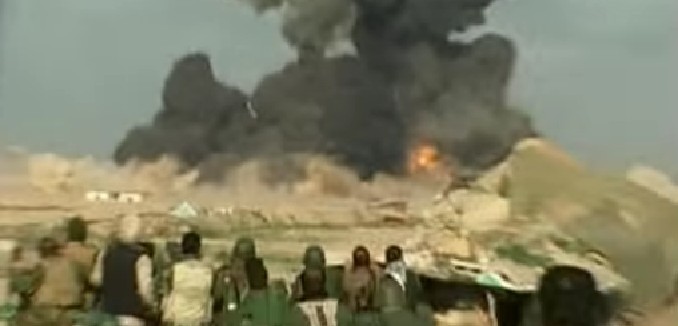While much of the world’s attention is focused on the war in Yemen against Iranian-backed rebels, as well as the aftermath of the nuclear negotiations between Iran and the P5+1 states, Iraq (backed by Iran) has achieved a significant achievement in the long battle against the Islamic State of Iraq and Syria (ISIS).
In recent weeks, the Iraqi army was able, with the help of Iranian-backed Shiite militias and United States-led air raids, to retake the city of Tikrit (Arabic link), the hometown of Saddam Hussein, from the forces of the Islamic State. Conquest of the city is but one step in the long journey to retake the territory that had previously been controlled by the extremist terror group.
The path to stability is still long, because the chaos in Iraq is not only a result of massive ISIS raids but also of corrupt sectarian governments that ruled the country in the decade preceding the conquest carried out by ISIS in northern and western Iraq.
ISIS, which ruled Tikrit for a few months, committed massacres and abuses against local population. Many residents were forced to leave their homes. The Iraqi army was able to retake the city after a month of battles. Tikrit, it should be noted, is a predominantly Sunni city and is considered a stronghold of the Sunni resistance to the pro-Iranian Shiite government in Iraq. Therefore, the victory in the city is symbolically important for Baghdad.
The Iraqi government used Shi’ite militias supported by Iran to take Tikrit. Analysts believe that the government had no choice but to do so because of the weakness of the army. After a while, the international coalition forces also began to intervene from the air, bombing areas in Tikrit. Shiite forces on the ground did not like the Western involvement and withdrew from the battle. After a few days, they returned to the fighting and helped complete the takeover of the city.
The Shiite militias were accused of looting and vandalizing the Sunni population of Tikrit. As a result, the Iraqi government decided to ban the Shiite militias from taking part in future attempts to re-capture Mosul, the main stronghold of ISIS. The news site al-Arabi al-Jadid reported (Arabic link) that this is an implied admission of mistakes made during the conquest of Tikrit. Iraq is expected to rely instead on air strikes of coalition forces led by the United States.
Tikrit, it should be noted, is a strategic city, since it leads to Mosul (Arabic link), Iraq’s second largest city and the most prominent city held by ISIS in Iraq. The conquest of Tikrit is therefore an important step towards the retaking Mosul from the terror group. But Mosul is a much bigger city than Tikrit and its liberation will be much more difficult.
ISIS has held the city for ten months has had more than adequate time to prepare for potential invasions. The city also is further away from Baghdad than Tikrit is, and the logisticis of transferring aid and military equipment to this area on a continuous basis are much more difficult. In addition, while most of the residents of Mosul abhor ISIS’s terrorism and control of the city, they are not fond of the government and the Iraqi army, which take orders from Iran and its proxy Shiite militias.
Iraq won the battle for Tikrit, but now it will have to gain the support of the Sunnis. Disgust felt by the Sunni tribes in Iraq to the country’s Shiite government facilitated the takeover of Iraqi lands by ISIS last year. According to some observers, members of the former regime of Saddam Hussein helped the terrorist group.
The Iraqi government needs the support of the Sunnis to keep the re-occupied territories’ stable. To do this, the government has been trying to integrate Sunni forces into the army divisions in Tikrit. Now, Sunni tribes are seeking funding and arms from the central Iraqi government, similar to the aid granted to Shiite militias.
Sunnis under ISIS control find themselves in a bind. On the one hand, they suffer from ISIS’s terrorist regime, which is full of religious restrictions and persecution. But they are also uncertain of their future under an Iraqi regime that is backed by Iran and allied Shiite militias. The cooperation of these three groups – Sunnis, Shiites, and the Iraqi army – ultimately will determine whether the liberation of Mosul from ISIS will be successful.




